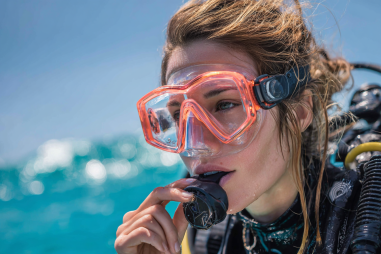Scuba diving is an exhilarating activity that combines the thrill of exploring underwater worlds with the physical demands of swimming and breathing underwater. Like any sport, keeping your body in optimal condition is crucial for safety and enjoyment while diving. However, just as important as the physical preparation is the recovery process between dives. Recovery ensures your muscles heal, your energy levels replenish, and your body stays strong for the rigors of diving. In this article, we’ll explore the essential strategies for scuba diving recovery and fitness, helping you stay at your best both below and above the surface.
The Importance of Recovery in Dive Fitness
Recovery is often overlooked by divers who focus solely on training and improving their underwater skills. But the truth is, recovery is just as vital as the exercise itself for maintaining dive fitness. When you dive, your body experiences unique stresses, such as pressure changes, cold water exposure, and increased physical exertion from swimming against currents or managing heavy equipment. These factors can lead to muscle fatigue, dehydration, and general exhaustion.
By allowing adequate recovery time, you help your body repair muscle tissues, reduce inflammation, and restore energy reserves. When recovery is neglected, it increases the risk of injuries, reduced performance, and even dive-related illnesses like decompression sickness due to impaired physiological function. In essence, recovery acts as the foundation that supports your overall fitness and dive readiness.
Signs of Overtraining in Divers
It’s important to recognize the signs of overtraining, which indicate your body isn’t getting enough rest and recovery. Overtraining can affect your diving performance and lead to burnout or injury. Common signs include:
- Persistent fatigue and tiredness that doesn’t improve with rest
- Reduced strength and endurance during dives
- Muscle soreness and joint pain lasting longer than usual
- Difficulty sleeping or poor sleep quality
- Increased irritability, mood swings, or lack of motivation
- Frequent colds or infections, indicating a weakened immune system
If you notice these symptoms, it’s crucial to revise your dive schedule and incorporate more recovery time to prevent further decline in fitness and well-being.
Active Recovery Exercises Suitable for Divers
Active recovery involves low-intensity workouts that enhance blood circulation and muscle healing without putting undue strain on the body. These exercises help clear metabolic waste, improve flexibility, and maintain mobility between dive sessions. Some excellent active recovery exercises for divers include:
- Swimming or Snorkeling: Gentle swimming keeps your muscles engaged without overexertion and primes your body for diving.
- Yoga: Yoga promotes flexibility, balance, and breath control—key attributes for divers. It also helps reduce stress and improve mental focus.
- Walking or Light Jogging: These activities increase circulation and promote muscle recovery while being easy on the joints.
- Foam Rolling: Using a foam roller or massage ball helps release muscle tightness and improve tissue recovery.
- Breathing Exercises: Practicing diaphragmatic breathing or apnea training can enhance lung capacity and relaxation, aiding recovery.
By incorporating these activities into your routine, you can speed up the recovery process without losing your overall fitness level.
Nutrition and Hydration for Optimal Recovery
What you eat and drink plays a fundamental role in how quickly and effectively your body recovers from diving. Proper nutrition supports muscle repair, rehydrates the body, and replenishes energy stores. Here are some essentials to keep in mind:
- Hydration: Diving causes increased water loss through breathing dry air and physical exertion, so drinking plenty of fluids is critical. Water is the best choice, but electrolyte drinks can also help restore mineral balance after longer or more intense dives.
- Protein Intake: Consuming adequate protein from sources like lean meats, fish, dairy, or plant-based options assists muscle repair and growth.
- Carbohydrates: Carbs restore glycogen levels in muscles, replenishing energy. Focus on whole grains, fruits, and vegetables.
- Healthy Fats: Omega-3 fatty acids found in fish and nuts help reduce inflammation.
- Antioxidants and Vitamins: Fresh fruits and vegetables supply antioxidants which combat oxidative stress caused by intense physical activity.
Timing your meals is also important. Eating a nutritious meal or snack within 30-60 minutes post-dive optimizes recovery processes.
Using Rest and Relaxation to Prevent Fatigue
Rest is more than just lying down; it’s a vital component of recovery that helps reset your nervous system and supports overall health. Fatigue can accumulate over successive dives, lowering alertness and increasing risk underwater. To combat this, prioritize quality sleep and relaxation:
- Sleep: Aim for 7-9 hours nightly to allow your body to repair and regenerate.
- Mindfulness and Meditation: These techniques calm the mind, reduce stress hormones, and enhance focus.
- Limiting Stimulants: Avoid excessive caffeine or alcohol, especially before diving or rest periods, as they can disrupt sleep quality.
- Scheduled Downtime: Incorporate breaks between dives or dive days to give your body a chance to rejuvenate fully.
By valuing rest and relaxation, you maintain mental acuity and physical readiness for every dive.
Role of Massage and Stretching in Recovery
Massage and stretching techniques are powerful tools to enhance recovery and maintain flexibility for divers. Regularly stretching key muscle groups reduces stiffness and improves range of motion, which is crucial when donning and maneuvering heavy dive equipment in confined underwater spaces.
Massage, whether performed professionally or through self-massage tools, promotes circulation and helps decrease muscle soreness. Specific benefits include:
- Breaking down adhesions and scar tissue from micro-injuries
- Reducing muscle tightness and cramps
- Enhancing lymphatic drainage to eliminate toxins
- Lowering anxiety and promoting relaxation
Incorporate dynamic stretches before diving to warm muscles and static stretches after dives to aid recovery. Targeting the shoulders, back, legs, and core is highly beneficial for divers.
Tips for Integrating Recovery into Dive Schedules
To gain the full benefits of recovery, it needs to be part of your overall dive planning rather than an afterthought. Consider these tips:
- Plan Rest Days: Include full rest days or light activities between intensive dive sessions.
- Warm Up and Cool Down: Do warm-up exercises before diving and cool-down stretches afterward to prepare and recover muscles.
- Adjust Intensity: Balance harder dives with easier ones and avoid consecutive days of highly physical dives without adequate rest.
- Listen to Your Body: Avoid pushing through pain or exhaustion. Modify or skip dives if you feel signs of overtraining.
- Use Recovery Aids: Consider compression garments, cold therapy, or sports massage as additional recovery tools.
By integrating these strategies into your dive routine, you’ll prolong your diving career and enhance your underwater experience.
Striking the Right Balance for Sustainable Dive Health
Fitness and recovery go hand in hand to keep scuba divers in top shape. While physical fitness improves your underwater endurance, buoyancy control, and safety, recovery ensures you maintain that fitness without succumbing to fatigue or injury. By recognizing signs of overtraining, incorporating active recovery exercises, maintaining proper nutrition and hydration, prioritizing rest, and using restorative methods like massage and stretching, divers can enjoy more comfortable, safe, and enjoyable dives.
Ultimately, the key to lasting dive health is balance. Listen to your body, respect the need for recovery, and integrate these fitness and recovery principles into your diving lifestyle. Your body and your dive buddies will thank you for it!







